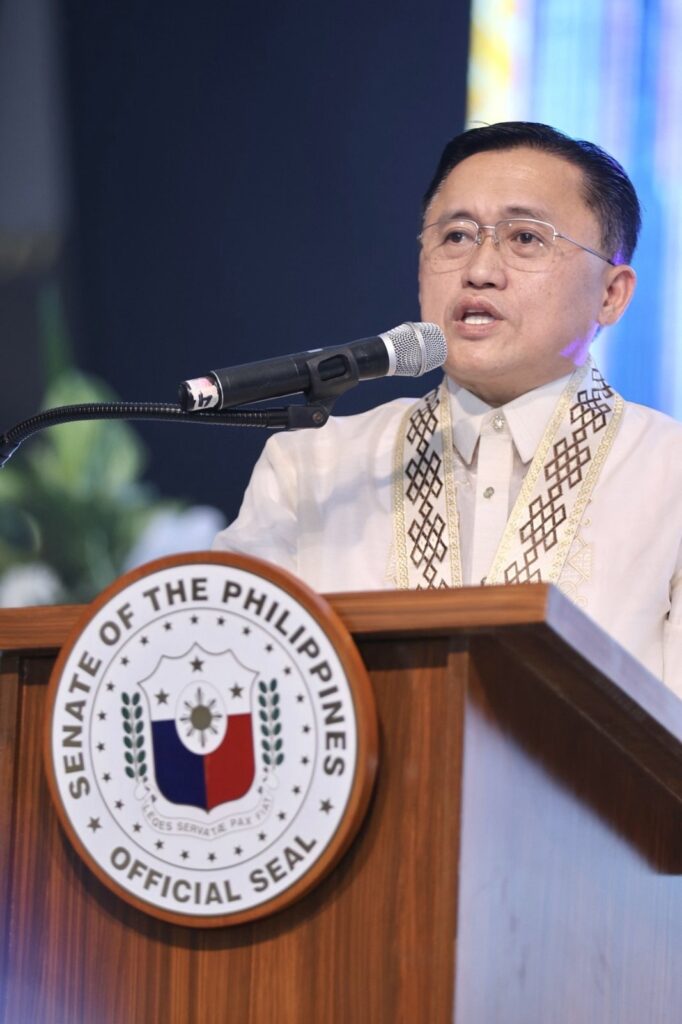
Senator Christopher “Bong” Go, who previously helped fight for the enactment of the Universal Access to Quality Tertiary Education Act during his time as Special Assistant to the President, has filed a bill in the 20th Congress that intends to amend Republic Act No. 10931 to further expand the coverage of the Tertiary Education Subsidy (TES).
Go recalled how he pushed hard for the law’s passage under the Duterte administration, even as some economic managers expressed reservations due to its budgetary implications. Ultimately, former President Rodrigo Duterte signed the landmark measure in 2017, a decision that Go supported behind the scenes in defense of the right to accessible education for all.
Now serving his second term as Senator, Go emphasized that while the landmark law has benefitted millions of students since 2017, more must be done to address inequities and improve access to quality education across both public and private institutions.
“Education is undeniably essential to inclusive growth,” Go stated in the bill’s explanatory note. “Children who are not in school are likely to be disadvantaged, and the conditions faced by these children can reinforce, if not exacerbate, existing socio-economic inequalities.”
He pointed out that most out-of-school youth come from low-income families, which he described as a persistent irony: “This comes as a great irony when considered alongside the fact that education serves as a great equalizer, allowing those from lower income levels to lift their families out of poverty.”
The senator, who also filed a similar measure in the 19th Congress, underscored the urgency of addressing systemic barriers faced by poor students in pursuing their desired courses. “While the law has been meaningful in changing the lives of millions of students, geographical considerations and limitations in the range of courses offered in public higher education institutions hinder students from pursuing their desired degree,” he said.
In response, the bill proposes the inclusion of qualified students from private Higher Education Institutions (HEIs) and Technical-Vocational Institutions (TVIs) into the TES program, especially those residing in areas where public institutions are unavailable or do not offer equivalent programs.
The measure introduces an expanded prioritization scheme, giving TES eligibility not only to students in public institutions but also to those in private HEIs and TVIs under specific conditions, such as when comparable degree programs are unavailable locally in public schools.
TES recipients, under the proposal, would continue receiving support until they finish their respective programs, provided they meet retention and residency requirements set by their institutions.
A key provision of the bill is the introduction of a voucher system for poor and academically qualified students studying in private HEIs and TVIs—even in cities and municipalities where public institutions already exist. This is detailed in the newly inserted Section 7A:
“There shall be a proportional budgetary allocation to support poor and academically qualified students through a voucher system to be administered by the UniFAST Board that shall allow beneficiaries to study in private HEIs and private TVIs in cities and municipalities where there are existing SUCs, LUCs, and public TVIs.”
The UniFAST Board, according to the bill, will determine eligibility based on academic and economic qualifications. Students already receiving TES will not be eligible for the voucher system to avoid duplication of subsidies.
The measure, if enacted, mandates the UniFAST Board to conduct a study within 60 days of the bill’s effectivity to determine the nominal voucher value based on prevailing tuition rates in private institutions. This amount will be reviewed every three years to adjust for inflation.
“With the help of my fellow legislators, we will also continue to help our future generations, the youth whose voices we heard last elections, and who hold the promise of a brighter future for our country,” said Go in his proclamation speech.
This move reaffirms Go’s legislative focus on education reform, particularly in expanding access for marginalized youth. As Chairperson of the Senate Committee on Youth and a staunch supporter of programs aimed at empowering the younger generation, Go continues to advocate for measures that bridge systemic gaps in public services—including education.
“Ang kabataan ang future leaders natin. Sila ang pag-asa ng bayan. At edukasyon po ang susi para sa mas magandang kinabukasan,” Go emphasized.
